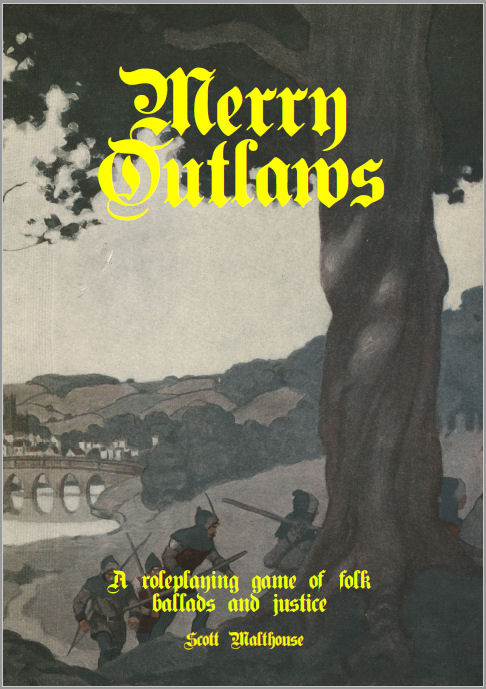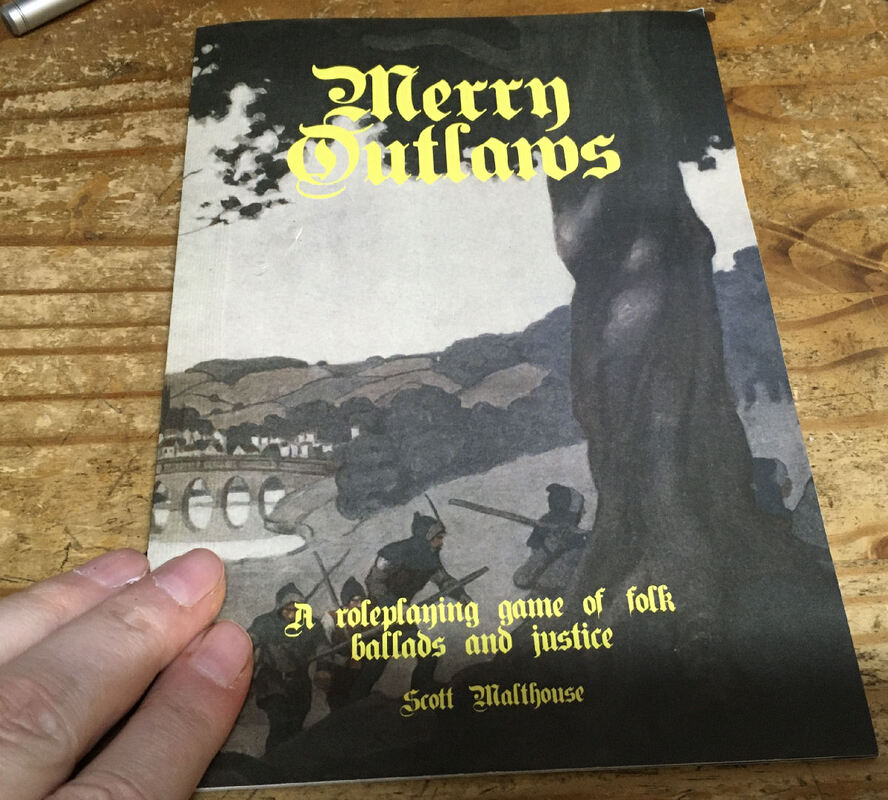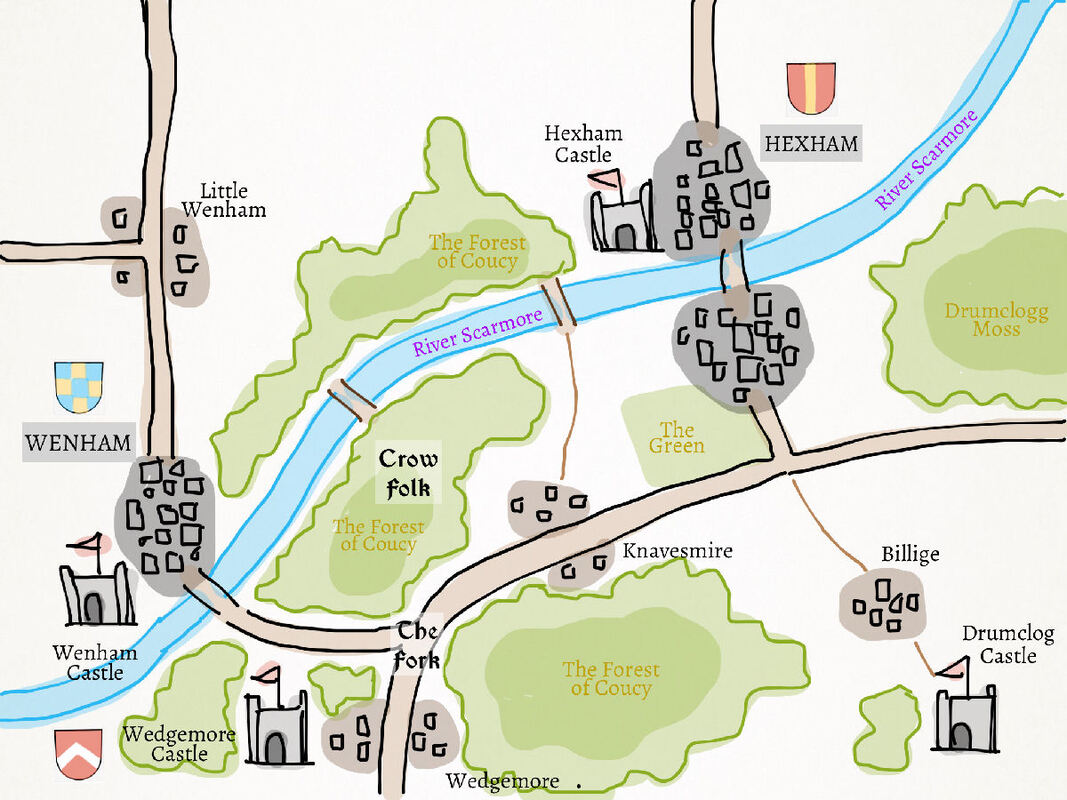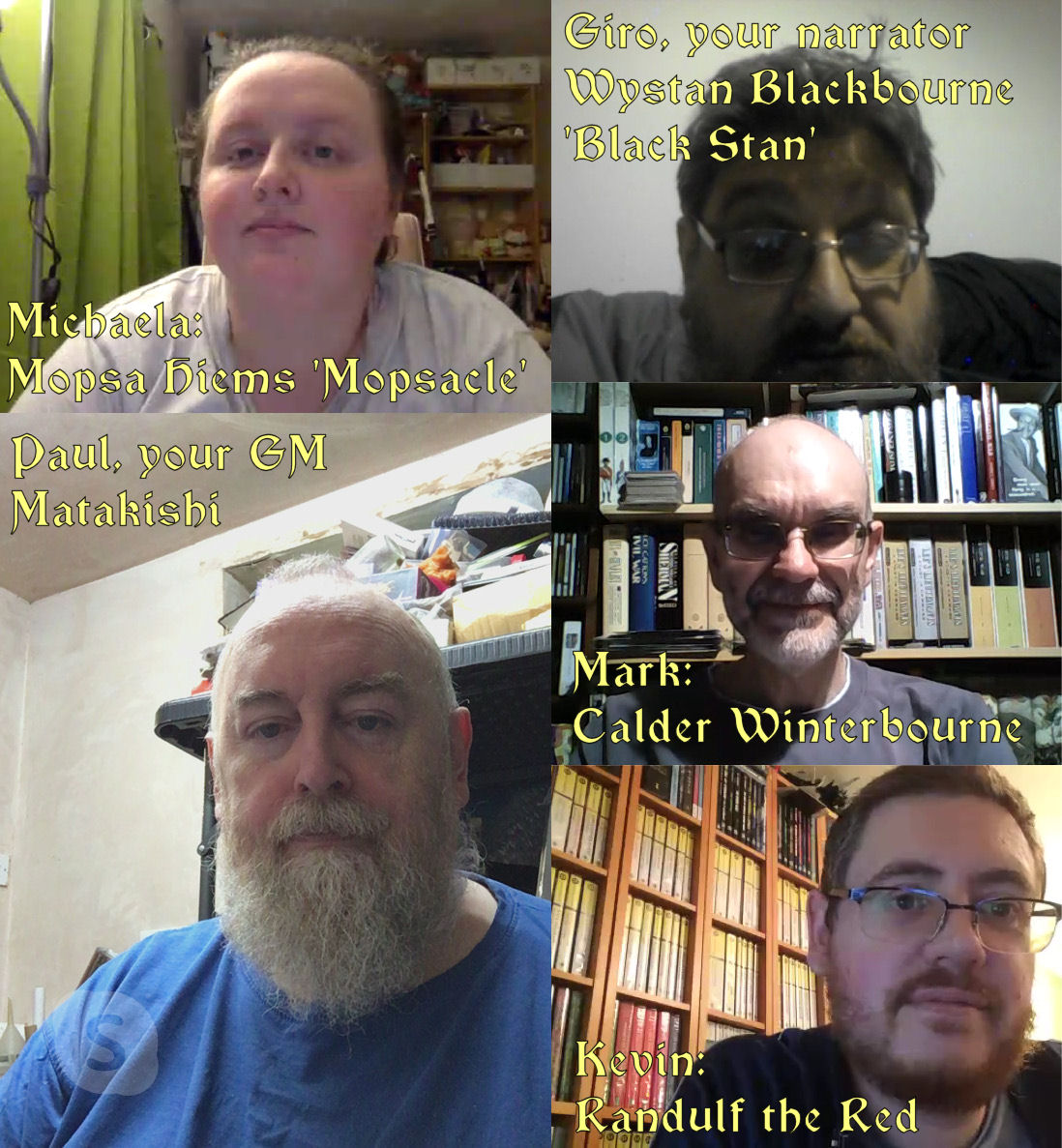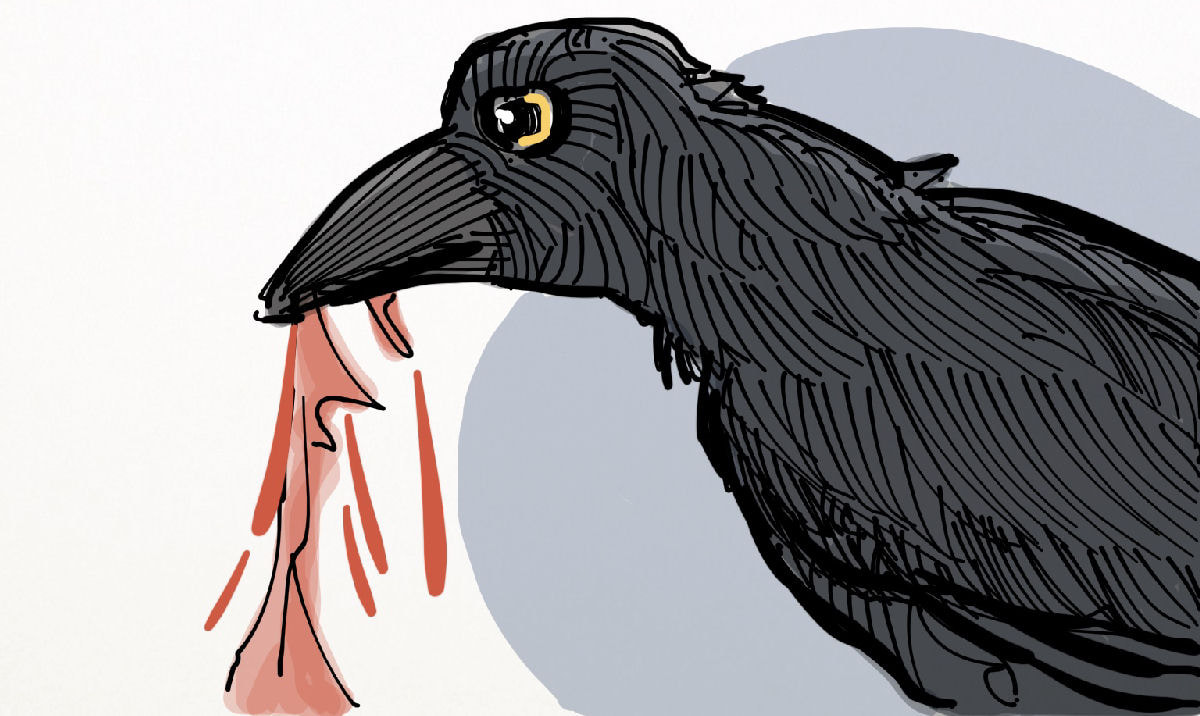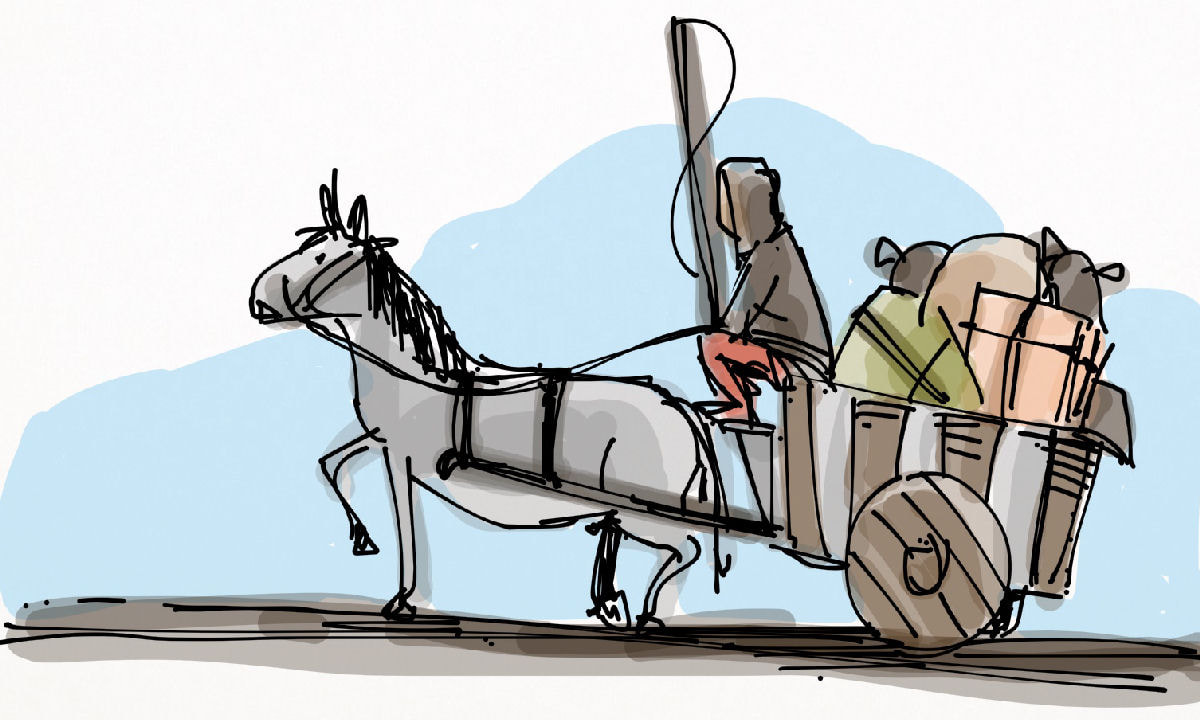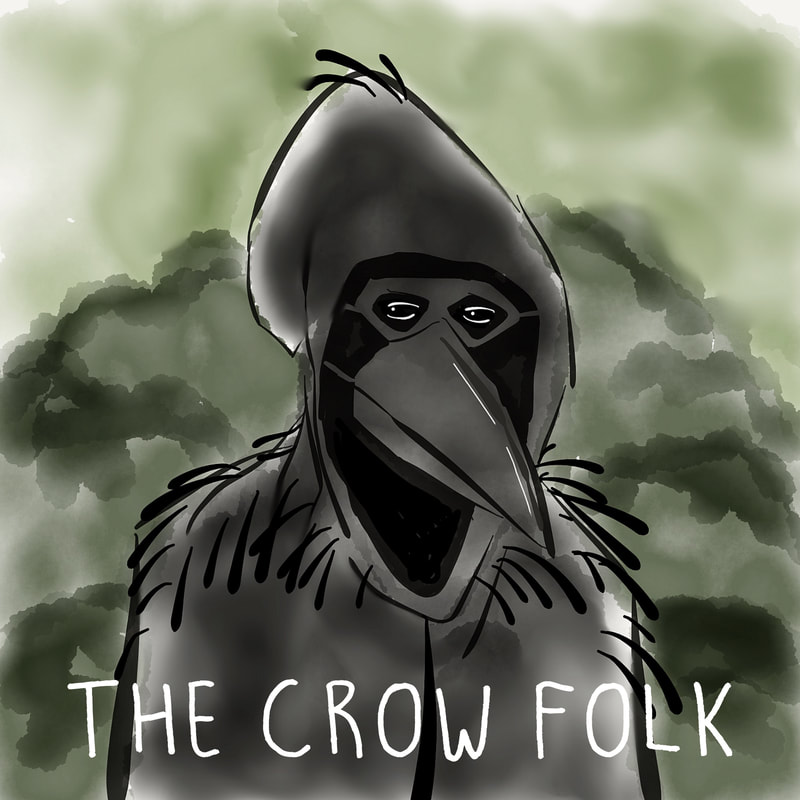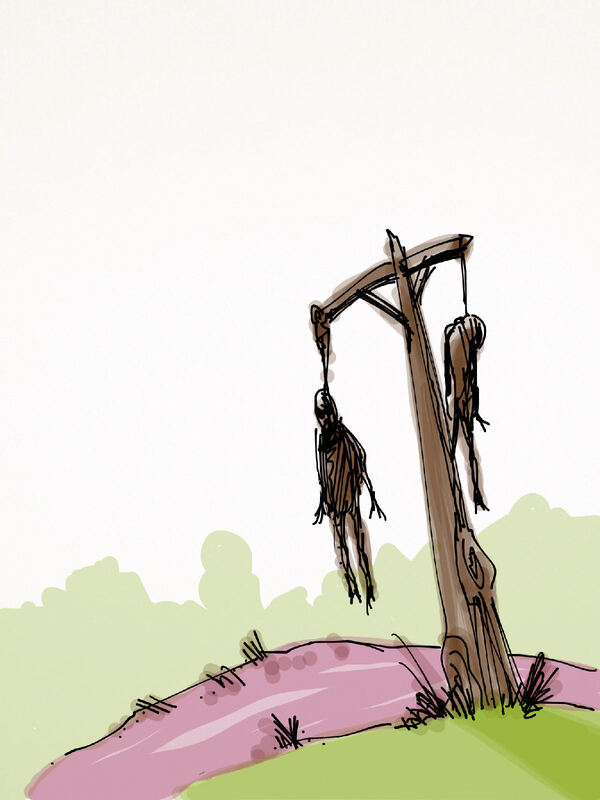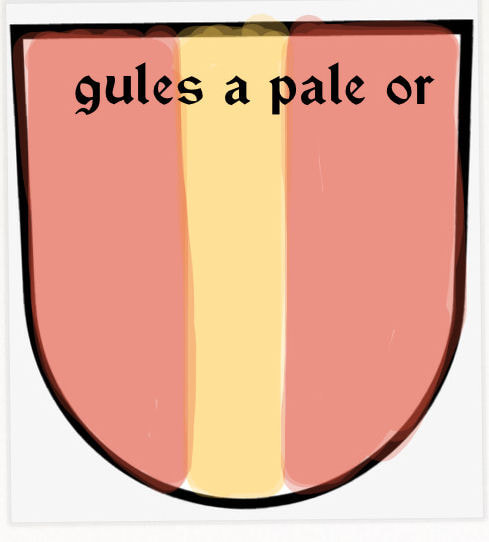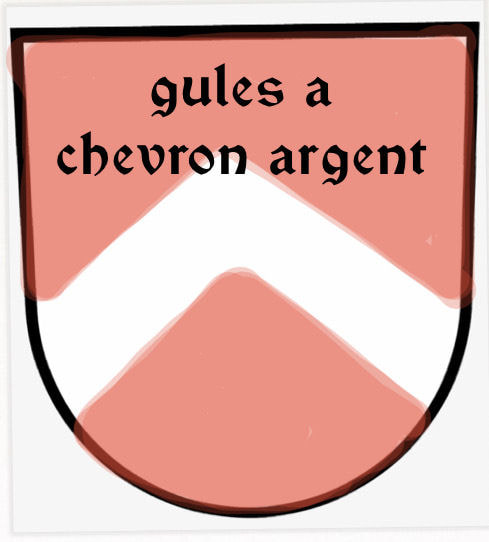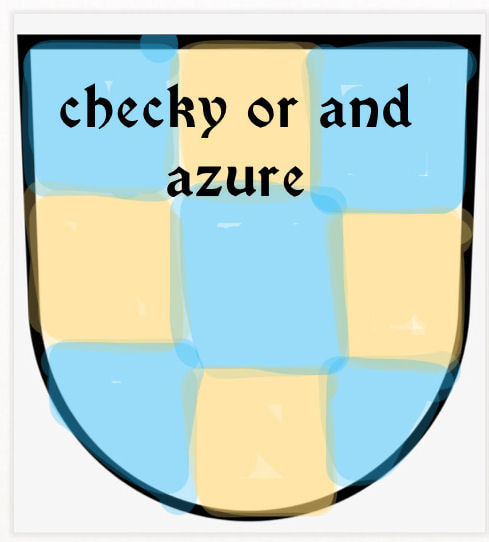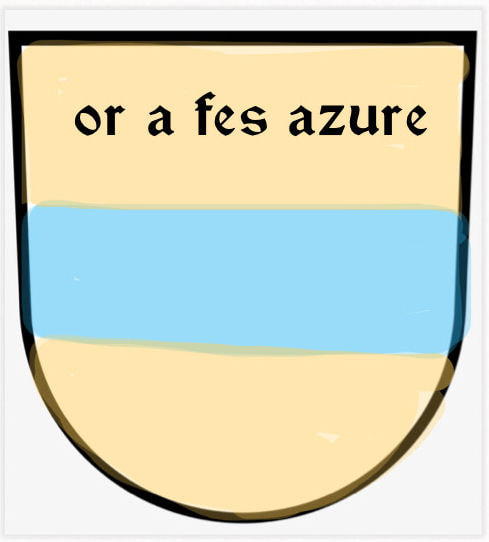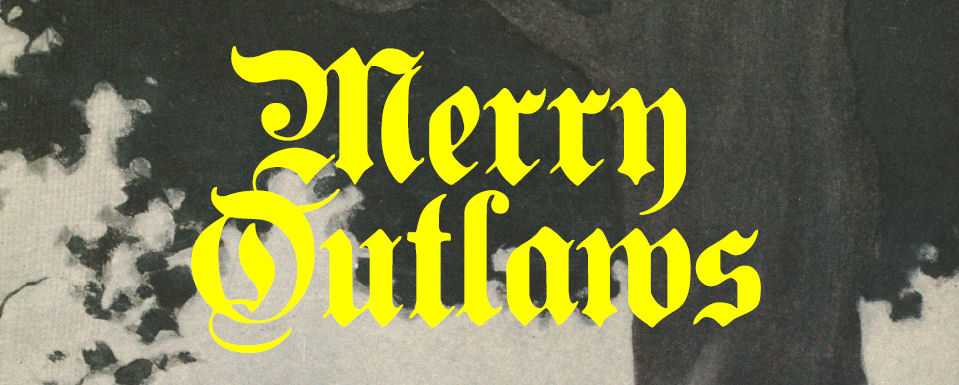|
Our merry band consists of:
Calder Winterbourne a.k.a Mouse Eater - played by Mark. Swift footed and skilled with the bow. Mopsa Hiems a.k.a Mopsacle - played by Michaela. Silver tongued and sharp-eyed. Randulf the Red - played by Kevin. Handy with both fist and mace. Wystan Blackbourne a.k.a. Black Stan - played by Giro. Wilderness traveller, well-informed and keeper of this chronicle. Knaves in Knavesmire
Gather round dear gentlefolk To hear a tale of woes A missing gown, a dreary town And corpses feeding crows Watt Taylor
Location: The Green. We had sent our four Welsh outlaw recruits into the deepest dells of The Forest of Coucy to build a camp for us. We felt it prudent to travel in a smaller less noticeable band. We we were strolling nonchalantly through 'The Green' when we heard shouts and yells for 'help'. The shouting was coming from the north and beyond some hedges at the edge of the green. Initially, only Calder warily went forward. Suspicious cries in the wild could be... suspicious. With some effort, Calder pushed through the hedge, on the other side he saw something he had never expected to see! There was a small camp fire with a spit roast, tied to the spit roast was a naked man with three black feathers sticking out of his backside! There were also crows pecking at a pile of naked corpses. Even though the man did not look too badly burnt, he was understandably yelling for help. We rushed over and freed him. He introduced himself as 'Watt Taylor' a clothing merchant from Hexham. Watt had been waylaid by bandits garbed in black whilst travelling to 'Knavesmire'. They had killed his guards, stolen his horse, cart and goods; then left him tied to the spit roast. Watt had been commissioned to provide a suitable wedding gown for 'Lady Margaret Chatsworth' who was to wed 'Sir Roland Godfrey, Earl of Hexham'. The wedding dress had been on the cart and was now lost. It had been created at great expense to the people of Hexham, who had donated to the cost. The cost had in fact run to three hundred coins Watt informed us. Three black feathers were the calling card of a band of violent outlaws known as 'The Crow Folk', as was their black clothing. The Crow Folk had a reputation for vicious thuggery and were known for their particular cruelty. They were also known for targeting both the rich and the poor for indiscriminate robbery. Watt told us that after they tied him up, they took the cart to the north-west, the trail left by the cart was quite obvious. This had been less than an hour ago. Emlyn the carter
While we had been talking to Watt, another cart had come trundling noisily down the road. It was heavily laden, piled high with goods and wares, it was being pulled by a sorry looking horse and had a laden donkey in the rear. After waving at the driver he came to a stop. We explained that we had a man here who had been robbed and the driver agreed to help us. He was named 'Emlyn', he told us that he had been travelling the road from Hexham to Knavesmire for years, supplying 'The Three Stoats and a Weasel' inn and in all that time he had never been robbed. This intrigued us. It would seem that The Crow Folk were the culprits. They seemed to never attack along this stretch of road. I thought it was quite the coincidence that they chose to attack here. They also chose the cart carrying Lady Margaret's wedding dress? But why would they risk attacking such a heavily guarded target? Surely there would be easier marks. Like Emlyn? There were many questions. Perhaps someone had paid them to attack Watt? Perhaps there were other people who were impersonating The Crow Folk? Again, many questions. Regardless of this; we needed to see Watt to safety and then look into matters. Emlyn was happy to give any of us a ride into Knavesmire so we sent Watt with him. We also dropped some coins into Emlyn's hand for his general decency. The Crow Folk
Leaving Watt and Emlyn behind, we followed the tracks through the field until they vanished upon reaching a lesser used road than ran north-south. Scrutinising the road, I saw evidence of a cart heading north recently. We walked north until the road ended at a river's edge, with a ford crossing to the other side. On the far side we saw the cart, it was burning and beginning to billow smoke! Rushing and wading across the 'River Scarmore' we discovered it was empty, there was no horse here, no wares and goods and definitely no wedding dress. Out of the blue, whistling arrows rained down on us, we had been caught unaware! The Forest of Coucy grew close to the northern banks here, scanning the tree line, we caught sight of figures, high up in the trees, wielding bows and dressed in black. It had to be the Crow Folk. Calder, Mopsa and I exchanged volleys with the Crow Folk, meanwhile Randulf charged at the trees yelling loudly! When he reached the closest tree, he began climbing. During his tussle, our assailants concentrated their fire on him and he took some hard blows. There were eight of them, when we bought down the fourth of their number, the remainder dropped down and fled. Calder, fleet footed as he was, gave chase and tackled one to the ground. We had ourselves a prisoner. We searched the dead Crow Folk and our prisoner, they were each carrying a larger amount of coins than we would expect. Perhaps they had been paid? Other than the coins, they was nothing important or identifying on them. The prisoner remained tight lipped when we spoke to him. No amount of coercion, intimidation and threats swayed him to loosen those lips. He steadfastly remained silent and unwavering, refusing to give us anything. It was clear that there was something else that he feared other than us. Knavesmire
In the end we decided to head to Knavesmire with our prisoner in tow. We turned south and followed the road into Knavesmire with an uneventful march. Knavesmire was a dismal place, hemmed in on all sides by the dim, menacing forest. There was no farmland here and no church either. Other than two rows of small brooding houses that lined the road, there was only the inn, by far the largest building in the settlement. The Three Stoats and A Weasel must have been full. There was a mob of soldiers in different liveries milling about outside and we could hear a distorted clamorous din escaping the inn's walls. No doubt this was all due to the wedding. Approaching, we could see the soldiers were displaying three different liveries. 'Checky or and azure' the livery of 'Sir Conrad Payne, Lord of Wenham Castle'. 'Gules a chevron argent', the livery of 'Sir Clugney Mannering, Lord of Wedgemore Castle'. The third livery, 'or a fes azure' we did not recognise, it was not of a local lord. We also spotted Emlyn's cart parked up close to the inn. Upon opening the inn's door, we were confronted with a wave of noise and the heat and smell of a crowded inn washed over us. Inside, it was thrumming. Here were the retinues that the soldiers outside were guarding, they occupied nearly every table, packing out the inn and running the serving staff off their feet. We could almost feel the floorboards vibrate beneath the soles of our boots! We did not see either Watt or Emlyn among the crowd. At one large table we did see several knights marked out by their liveries and apparel. Sir Conrad was here, by his countenance he seemed to be in charge and appeared to be comfortable issuing orders. Close to Sir Conrad was a woman, Lady Margaret no doubt. By her side was another knight, he wore the unrecognised livery we had seen and his face shared many a feature with Lady Margaret and was a similar age. He may have been a relative, a brother or cousin perhaps? Finally, next to him was Sir Clugney. Just desserts
Now we needed to approach Lady Margaret, this would not be so easy. We could not simply walk up to her. Instead we watched the knight who was related to her and learnt that he was 'Sir Gaston Chatsworth', her brother. It was Sir Gaston's sergeant we decided to approach and explained that we needed to speak to Lady Margaret about her missing wedding dress. The sergeant seemed convinced by this but took us to Sir Conrad. Once the pleasantries were done, we explained that Lady Margaret's wedding dress had been stolen and we believed that The Crow Folk were responsible. Sir Conrad stated that Watt Taylor had already given him this information. Sir Conrad then asked if we had recovered the dress? We replied that we had not found the dress, but we had caught one of the thieves. Sir Conrad turned to the outlaw and questioned him. The bandit remained as defiant and tight lipped with Sir Conrad as he had been with us. It appeared that Sir Conrad was a man of little patience and in no mood to bandy words. Once he realised that he would get nothing out of our prisoner, he summoned his sergeant and ordered him to. "Take this prisoner outside, cut his hands and feet off and hang him from a tree.". The sergeant and some soldiers took custody of the prisoner and dragged him out. Minutes later we heard cheering, screaming and shouting, followed by silence. The sergeant came in and informed Sir Conrad that the deed had been done. Sir Conrad then ordered him to have the body taken to the Fork and hanged on the gibbet there. The man in black
We squeezed into some seats and took a look around. There was a man watching us, a member of staff here. We beckoned him over, he came and stared, we shouted an order for some food and drink, but he just stared. Another member of staff rushed and apologised for 'Philip' explaining 'he's a bit simple', ushering Philip away. We managed to order some food and drink, it was surprisingly of a fair quality. A little later and Emlyn presented himself. He explained that Watt was here and had taken a room and was resting from the day's events. Watt had our sympathies, the dayhad similarly taken its toll upon us. Still, we hung around until evening, keeping an eye out for anything 'suspicious'. After all, this was a village called 'Knavesmire'! It was then that we saw a tall man, dressed entirely in black leave the inn. This drew our suspicions, so we carefully followed him. As he passed villagers, they made reverential gestures to him, which he acknowledged. He then entered a small house. He did not wear any articles that marked him out as a religious sort, but he seemed to have the bearing of a priest. Perhaps it was the black clothes or perhaps the black clothes marked him out as a member of the Crow Folk. Now that we were outside, we could see numerous villagers bringing plates of food to Sir Clugney's men. Curiously, no food was being bought to the other soldiers. Before there was a chance to do anything else, the tall man in black exited the house and began heading back to the inn. We followed, as we got closer, we could see that all the soldiers were cramming at the door and windows, almost climbing over one another to get a view inside. The unruly din of earlier had been replaced with the soft melodic tone of lutes. It was with effort that we pushed our way through mass of packed bodies back into the inn. Crispin and Odo
Here it was that we discovered there were two musicians, the twins 'Crispin' and 'Odo', they were renown minstrels. It was said their talents earned them many coins. It appeared that they had been 'warming up' as we arrived and opened their performance with a cheeky little ditty. Engerrand Rolfe the Sheriff of Hexham Rode round extolling all folk in the town To part with their coin on peril of harm For to gift a lady a brand new gown He collected a princely chest of coins With blows and threats and belligerent curses Some he spent on a dress full worthy Most he kept in his own closed Purses "Enough!" Roared Sir Conrad, standing and slamming a fist on to the table. "Sing us a different song," he ordered. After this, the brothers proceeded to sing about less inflammatory subjects! Their set lasted a while and Calder took the opportunity to gossip with some of the soldiers. The soldiers stated that: - The events alluded to in the twins' song were true. - 'The Sheriff of Hexham, Engerrand Rolfe' had gone around forcing merchants to pay up for the gown. - This was a marriage of state and convenience. - The tall man in black was 'Osric of The North'. Calder asked about who was the power in this part of England. The soldiers explained the pecking order around here: 'Sir Roland Godfrey, Earl of Hexham'. Sir Conrad Payne Sir Clugney Mannering 'Engerrand Rolfe, Sheriff of Hexham'. Although he was actually a commoner. By now, the evening was drawing to a close and The Twins played their final song. Dark as night and black as sin Led by brothers three The Crow Folk lurk around this inn They’ll prey on you and me Beware the deadly sable knaves Who lurk among the trees They send the low to an early grave And bring the high to their knees They care not a fig for weak and poor They steal and maim and kill They’re here right now, beyond that door They mean you nought but ill It was quite a song to finish the night with. It implied that The Crow Folk were close by, quite possibly living in Knavesmire. The old woman and the curse
After this, the inn began to empty. Eventually, the only people left were those who would be sleeping on the wooden floor of the drinking room - which included us. It had been a hard day and we welcomed the rest. We awoke to the bustle of activity. Looking outside, Sir Conrad was shouting orders and gesticulating wildly, the soldiers were packing up their kit. Breakfast was a hurried affair. We watched as the soldiers hitched up the horses to cart that was filled with valuables and gold. Lady Margaret's dowry; oh to be able to redistribute that! Lady Margaret made her entrance, there was no hiding the unhappiness on her face, no doubt due to the loss of her dress. The soldiers made her carriage ready. The soldiers themselves, did not seem like a cheerful lot either. Some of them seemed most unhappy to be taking orders from Sir Conrad. As all of this was going on, an old woman hobbled in the direction of Sir Conrad, surprised, turned to face her. She spoke. "Poor lord Conrad, Cursed you be, I see an early death for you, beneath a tree" Conrad retorted with, "For you, not me, Hag!" as a look of fury contorted his face for a moment. "Take her to a tree and hang her," He ordered his men. As his men came over, we glanced at each other. Hanging the bandit was one thing, but an old woman...Randulf stepped up to Sir Conrad and pleaded with him to reconsider. "She is old and simple and doesn't understand what she is saying," he said. Conrad looked at Randulf for a long moment and we held our breath. "Take her," Said Conrad. "And keep her under control." Conrad ordered his men to release the old woman to us. It was now that Osric made an appearance. It was clear that the old woman was about to repeat what she had already said, but Osric leaned over and spoke in her ear. She seemed to calm down and fell silent after this. We, along with Osric accompanied the old woman back to her home. "I was just speaking the truth," she insisted along the way. Osric seemed to have the ear of the old woman and we asked if he played an important role in Knavesmire. Osric replied that he occasionally advised Sir Clugney on 'spiritual matters' from time to time and nothing more. Upon our return to the inn, Sir Conrad had mounted his horse and was preparing to lead the newly gathered procession. Before leaving, Conrad turned to Clugney and loudly ordered him to, "Sweep the area for the gown. Don't bother coming back without it." With that the procession headed west on the road for Hexham and a relaxing calmness settled upon Knavesmire upon their exit. Into the lair of the Crow Folk
Only the smallest retinue, that of Sir Clugney had not departed. They were a shambolic, run-down looking band of men, their threadbare and faded liveries had seen better days. Sir Clugney ordered his men to pack up as they're going home. They had no intention of obeying Sir Conrad's orders. Going to the sergeant, we asked him what was going on? The sergeant explained that they suspected that Conrad had taken the gown himself and they weren't going to waste their time searching for it. We also asked him what he knew about Osric. He told us that Osric had come from Scandinavia on an open topped boat he had steered himself. Soon after, Clugney and his retinue also departed. The morning was still young and there was time enough to go searching for the dress, since no one else would! We had a plan! Find The Crow Folk in the forest and find and take the wedding gown. Hexham was close to the forest's easternmost border, so we would travel through the forest to Hexham. Simple. What could go wrong? Leaving Knavesmire behind, we backtracked to the ford at The Forest of Coucy and crossed to the northern side of the River Scarmore. the cart that was on fire yesterday had been reduced to a pile of blackened wood and ash. The bodies of The Crow Folk that we had felled were gone, reclaimed by their accomplices. The forest was lush, shady and remote, tall trees swayed and rustled softly as occasional birdsong floated on the air. Our search for tracks was successful and we found evidence of movement. The tracks led us westward, they followed the river's course and skirted along the forest's border with it. Eventually the tracks turned south and we came to another ford. Crossing back to the southern side of the river, we picked up the tracks again and continued on. Soon we lost sight of the river as the tracks took back into the forest. Deeper went tracks into the forest and deeper became the forest. We lost sight of anything beyond trees and even the sky was hidden from us, save for occasional sunlit gaps that broke through the branches above. Every careful, quiet footstep seemed like a crashing, thunderous stomp in the stillness. Warily, we continued following the tracks until Mopsa warned us to stop. Mopsa went forward and revealed a hidden pit trap. Branches lined with leaves had been laid across a pit and at the bottom were sharpened wooded stakes. Quickly we looked about us, there were four Crow Folk up nearby trees. They realised that we had spotted them and attacked! We exchanged bow fire with them and of course Randulf charged a tree yelling loudly. He climbed a tree and pulled on a leg violently. The man fell, limbs flailing and landed in the spiked pit with a resounding thud and a shower of blood. Soon enough, the remaining enemies were defeated. There were four corpses and four of us. So we stripped them of their masks and hooded cloaks. With the blood cleaned off them, they provided us with disguises. We continued following the tracks and once again Mopsa commanded us to stop. This time she has found a tripwire across the track. And once again we looked around to find four more Crow Folk. This time they didn't attack, fooled by our disguise. So for once, we we able to ambush them! The fighting was over quickly, Randulf only just had the opportunity to charge a tree, yelling loudly, and climb it! The tracks continued on and so we followed. After a while the trees began to thin out and green leaves above gave way to blue sky. The dense forest melted away to patches of clear ground. We had found a hollow. More than that, we had found The Crow Folk. Wooden buildings were scattered throughout the hollow, they were rudimentary but functional. There were people working and walking about here, there were homes and sheds with the amenities of a village. Would our disguises work here? Only one way to find out. Trying our best to not make eye contact, we entered the Crow Folk village. The people here paid us no heed, were unaware that we moved among them. As we strolled through the settlement, furtively looking left and right, we watched the passing people engaged in their day-to-day activities. This may have almost seemed a normal village, but it was filled with people who would kill us given the opportunity. Somewhere in here was the wedding gown. Our cautious searching paid off. Mopsa found the dress, it was being kept within a heavy wooden box. Taking the gown out of the box and leaving with it would be too conspicuous. Instead Mopsa picked up the box and we made to leave the settlement... Mopsa had barely moved when two men approached us. We remained calm as they asked what we were doing. Mopsa casually replied, that we had been told to move the dress. They seemed convinced, they had no reason to be suspicious. They even offered to help carry the box for Mopsa. Mopsa thanked them, but explained that she would be fine. With that, we departed. We backtracked again. We knew the way now and knew that it was clear of threats, so we made good time. We encountered no problems on the return journey.Eventually this saw us to the north eastern perimeter of the forest and in sight of Hexham Castle. We thought it best not to enter Hexham wearing our disguises. We found a suitable spot to stash the garments away until we returned. Then we turned to Hexham. Returning the gown
The towers and battlements of Hexham castle soared above the town that surrounded it and the castle's curtain wall had been extended to include the settlement. All a stone and brick reminder of its owner's power to the small homes that sat in its shadow. Lugging the wooden box, we walked through the town and to the castle. Somewhere in there was Lady Margaret, we had to find her. We were allowed to walk around the castle's ground floor unchecked, but there was no sign of Lady Margaret. After an exchange of coins with a servant, we learned that she was on the upper levels, the way was guarded though. We sought to find a way to circumvent the guards, but a castle is designed to resist intruders and this was no easy task, particularly in daylight. Thus, no solution presented itself to us. In the end, we approached the guards hoping to convince them to let us pass. After all, Mopsa did have a way with words. We were taken by surprised when the guards told us that we are expected! We were led to Lady Margaret's chambers, they were well decorated as would be expected for someone of her standing. The chamber was also adorned with all the wealth of her dowry to Sir Roland. Lady Margaret recognised us as we were introduced. Her misery was easy to see, but a hopeful look crossed her face when we entered. Opening the box, we showed the gown to Lady Margaret. Helpfully, she asked us what reward we wanted for recovering it? We knew the gown cost the people of Hexham three hundred coins, so we asked for four hundred! Lady Margaret did not blanche at the cost. Instead she opened a chest piled high with coins and counted out four hundred of them. "I'm sure that Roland won't miss it," she commented. We could not help but notice that it had made no dent to the trove of coins. Perhaps we should have asked for more! The gown and the coins were exchanged, Lady Margaret's mood was much improved. We made our farewells and left. We had four hundred coins, plus the coins we had taken from the dead Crow Folk meant that we had about five hundred coins. It was a sizeable amount and needed redistribution to the needy. After some discussion, we decided to split the money up. Half we gave to Emlyn and Watt for distribution to the traders in Hexham who were forced to pay for the gown. The other half we gave to Friar Nicolas to distribute to the needy as he saw fit. So ended the second ended escapade of out merry band. |
Merry Outlaws
In this RPG, players follow in the footsteps of Robin Hood. Robbing the rich to pay the poor, fighting the injustice and corruption that persists in sunny England. Merry Outlaws is definitely a 'lite' RPG. It runs to just over twelve pages - including evocative illustrations. The rules are well laid out to view on screen and simple to understand. Everything is handled by rolling one or two six sided dice, the higher the better. When rolled this will produce one of four results that are analogous to; very good, good, fail, and critical fail. Combat is handled in the same way. Character creation is as simple as can be roll for (or pick) a personal code, two abilities and two starting items and a weaon. If a PC has a pertinent ability or some other advantage, they have an edge. Conversely, if a PC has a disadvantage, then they have a setback. This is a advantage/disadvantage mechanic. Finally we have character progression, this is where the game stands out. Merry Outlaws eschews the usual XP or level-up paradigm. Instead players are forging their own legend through the creation of a ballad! At the end of every adventure each player creates a stanza - a four-line poem to add to their ballad. As players continue their adventures, their balled will lengthen. Additionally, as they accumulate stanzas, they will acquire new abilities. Once a character has ten stanzas in their ballad, they retire. All in all a short, sweet and simple RPG. Worth trying if that's your cup of tea. The Adventure
Gather round dear gentlefolk To hear a tale of woes A missing gown, a dreary town And corpses feeding crows The County of Hexhamshire
The Players
Because of lockdown, we're playing over Skype. The Ballad of Mopsa Hiems 'Mopsacle'
Rumble rumble in the village We shout and perform in little Billige Down the road and through the woods Defeating great Giles, who thought we could? Father and daughter reunited, To save poor Alice we can’t be short-sighted Back at the mill, held against their will “Here they are, the real witches Come Mr Mereck and smack these bitches” Wedding gown stolen, Three feathers in its place We rushed through the forest There was no time to waste Traps nor Crows could not stop us We’d get it, come what may 400 gold for the dress returned Priceless to save her day The Ballad of Black Stan
Fine Alice from Billige, accused. Blodwin gone, was kidnapped. A witches trial we denied. And thus, Giles got slapped! A horrific sight encountered. Three feathers up the arse! By crows, the bride's gown was stolen. Saved, reward to folk, passed. The Ballad of Calder Winterbourne
From ‘Early English Ballads, Poems and Folk Songs’ (1893): ‘It is unclear where or when the ‘Ballad of Calder Winterbourne’ originated. No copy exists with provenance earlier than the mid-fifteenth century (and that only a fragment). It is likely that early versions have been adapted by others over the centuries and sections re-written or entirely new text added, perhaps to add contemporary references, incorporate unrelated fragments or cover situations likely to be familiar to new, later readers. There is, for example, an oblique reference to a possible act of enclosure in the prologue, which must either be a poor transcription or later addition to a supposedly ‘medieval’ text. No reference to Calder Winterbourne exists in the historical record and it is therefore likely that, if he ever existed, his story has been greatly embellished or his tale is a combination of several stories combined in a convenient narrative thread.’ The Ballad of Calder Winterbourne Prologue Calder Winterbourne, archer bold Born afar in Blackmore Vale Full man o’war, full man o’peace Far-sighted, swift and hale. Served his lord full time in France Gave all honour and duty. Came back with naught but empty hands Nowhere a sign of booty. Returned to see the Vale closed down The villagers all evicted Saith he ‘I served ignoble lords Now shall I never more’. Calder has taken to his travels. He wanders near and far Trusts not the rich, befriends the poor, Takes all men as they are. Part One To hear a blacksmith’s tale of woe His daughter held by Giles Another woman held for trial A witch? A slander vile. Four foresters guide to Giles tower Outside henchmen in force. All take stock and arrows nock, A bold rush is the course. Calder’s arrows fly and two men die Giles slain in dreadful fight. His henchmen turn and see the light The blacksmith’s daughter is aright. A witch is held for loss of flour, The miller is distraught The cause is naught but pilfering Yet from a bloodstained thought. A forester’s been done to death His friends the guides are grieving. A blackmailed man is stealing flour To hide innocence with thieving. Now truth is out and witch is freed, No charge in any eyes. Loot found, restored, in easy shares And a new-named Calder Wise. Part two Now safely camped in de Courcy They look t’ward easy living A blameless life, an end to strife, Days of gathering and giving. But Black Crows are in the meadows Wat Taylor’s going to burn The Crows have stole a wedding dress All honour do they spurn. At Knavesmire side Wat’s wounds they bind Carter Emlyn aids them. They take their rest and full refreshed By Odo and Crispin’s singing. The village fills with gentry’d folk To Hexham their road winds A missing dress? Oh woe! Distress! All are commanded ‘Find!’ Great search ensues as trouble brews, For Mannering’s men are slacking. Courcy’s crew their search renew They need no other backing. They track their foes, the evil Crows, Black Stan has heard their calling, And Mopsacle undoes their traps, At all points Crows are falling. To search Crows’ nest without arrest: How, in a camp this size? A simple feat for crew includes Ranulf, Lord of Disguise! Now Mopsacle has found the dress, To Hexham heroes hurry. Return of gown lifts bridal frown And frees her mind from worry. In gratitude, reward is made Wedding party is delighted. Crew bids adieu and melts from view Now troths can all be plighted. The cost of dress drawn with duress From common folk to vex them A shadow falls within town walls: Sheriff Rolfe, the curse of Hexham. “Reward’s not ours – the people gave, Now we can make amends. Money goes to those in need Through Friars and our friends.” The Ballad of Randulf the Red
Stand and listen gentlefolk A giant cometh across the land Let us speak of a grappling God Randulf the Red, brute of his band With a grin he wrestled the best Tankards of mead followed a great draw With sweep of his arms, bandits were battled Until the ghastly one was no more He climbed great oaken trees To take the crow men by surprise To save a maidens wedding day He became the master of disguise Emlyn the carter
One of the Three Crows
The Fork
You can buy your own copy of Merry Outlaws here:
These write-ups by Giro can be read on his excellent website Three Spellcasters and a Dwarf before they appear here.
|


